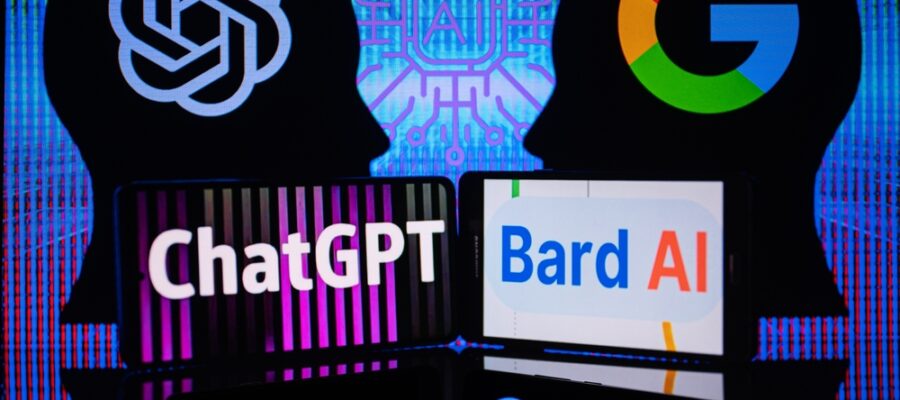Bard vs. ChatGPT: How Do They Measure Up?

Artificial intelligence (AI) is rapidly changing the world, and nowhere is this more evident than in the field of natural language processing (NLP). NLP is the branch of AI that lies at the intersection between computers and human language.
In recent years, there have been significant advances in NLP, thanks to the development of large language models (LLMs). Massive datasets of text and code train LMMS, meaning they can generate text, translate languages, write different kinds of creative content, make recommendations for search engine optimization (SEO), and answer your questions in an informative and conversational way.
Two of the most prominent LLMs are Bard and ChatGPT. Bard is a product of Google AI, while OpenAI developed ChatGPT. Both Bard and ChatGPT are incredibly powerful tools with different strengths and weaknesses.
What Are Bard and ChatGPT?
Bard is an LLM developed by Google AI. With this AI, a massive dataset of text and code, including books, articles, code, and other forms of writing, train the system. Bard can generate text, translate languages, write different kinds of creative content, and answer your questions in an informative way.
ChatGPT is an LLM developed by OpenAI. It’s trained on a massive dataset of text and code, including social media posts, online forums, and other forms of informal writing. ChatGPT can generate text, translate languages, and answer your questions more casually.
What Are the Key Differences Between Bard and ChatGPT?
We wanted to know the key differences between Bard and ChatGPT, so we asked them.
Dataset
Bard claims a dataset of books and other literary works trains it, focusing on generating creative writing and storytelling. As the “Bard” name suggests, the dataset comprises fiction, poetry, plays, and other forms of creative writing.
The training data exposes Bard to a wide range of literary styles, themes, and genres to enable it to generate engaging and imaginative responses.
On the other hand, ChatGPT says a much larger and more diverse dataset of text from the internet fuels its answers, focusing on generating natural language responses to a wide range of queries and prompts. The dataset used for ChatGPT’s training includes a broad range of topics, styles, and formats, such as news articles, blogs, academic papers, social media posts, and more. The training data represents the language used in the real world and enables ChatGPT to generate accurate and informative responses to various questions and prompts.
Accuracy
Bard is generally more accurate than ChatGPT because it’s trained on a more extensive and diverse text dataset. Like all LLMs in 2023, however, it can also offer highly possible counterfactuals with a confidence that may have you skipping the fact-checking and believing its “hallucinations” (lies). Bard offers a choice between multiple versions of its output, which is helpful, and often includes a table of the information it’s giving you, just as a little treat.
ChatGPT’s text dataset focuses on social media and online forums. This can lead to inaccuracies, especially when users ask the AI to generate text on formal topics. It also has limited knowledge of data falling after September 2021.
Creativity
Bard and ChatGPT can generate creative text formats, such as poems, code, scripts, musical pieces, emails, letters, etc. However, users may consider Bard a more creative AI than ChatGPT when creating original content.
ChatGPT is more focused on factual writing. Which isn’t to say it can’t excel in creative pursuits! Just that it’s better used to generate rough sketches and templates than hoping it will compose the next great sonnet.
Ease of Use
Bard and ChatGPT are both easy to use. However, Bard is generally more accessible because it has a more intuitive interface and is more forgiving of errors.
ChatGPT has a more complex interface, and it is less easygoing. Creative prompting goes a long way with GPT-4, and it’s no wonder an entire prompt industry and workforce are already popping up around the discipline.
User Experience note: If you enjoy the pleasure of seeing ChatGPT’s dizzying spill of one word at a time, as many users seem to, the blink-of-an-eye production of Bard’s multiple outputs might be a little disappointing or even feel less trustworthy.
Cost
Bard is currently available for free. You may spend some time on a waitlist, but try registering with your personal Google account rather than a work email.
ChatGPT-3.5 is available through paid subscriptions of $20, with GPT-4 also available but throttled: GPT-4 limits users to 25 messages every three hours. Remember that each “message” can contain 500-1,000 words or more, so you may never see those limits.
Dallas SEO Dogs Has the AI Expertise
If you need an AI that is accurate, creative, and easy to use, then Bard is the better choice. If you need an AI that can partner with technical writing and similar tasks, ChatGPT might be better.
In the end, what matters is your ability to form a certain kind of relationship with the AI so that you can better predict what prompts will get you the best results. Both engines can remember earlier parts of your conversation, and ChatGPT even sorts your conversations by AI-generated topics so you can return to a conversation later or change the direction of your inquiry.
It’s important to know these tools before they take over. There will always be a place for writers in the marketplace because AI-produced copy is easy to spot. It lacks spontaneity and creativity. In this case, the creativity required to build a connection between what you want and the ways to get it.
Dallas SEO Dogs offers human-driven content, and we don’t rely on AI to perform accurate SEO for our clients or to create our original content. Bard and ChatGPT are great tools, just like spellcheck or even a grammar check, but nothing beats real human interaction.
If you want to improve your SEO with top-of-the-line techniques, simply reach out today, and we’ll show you exactly how we can improve your site’s traffic with style, speed, and heart. Contact us today.
Reach out to us and schedule your free consultation today!
